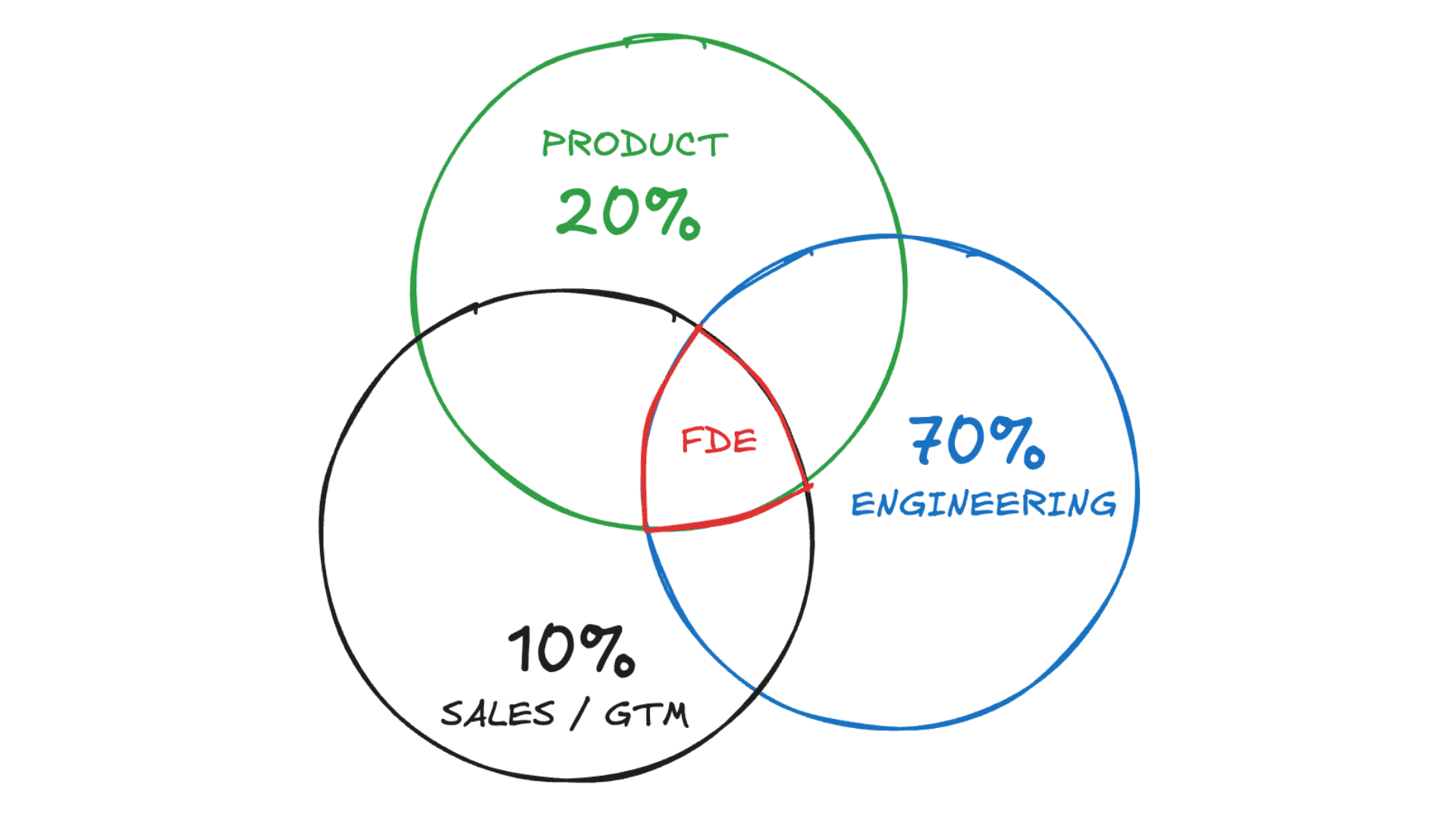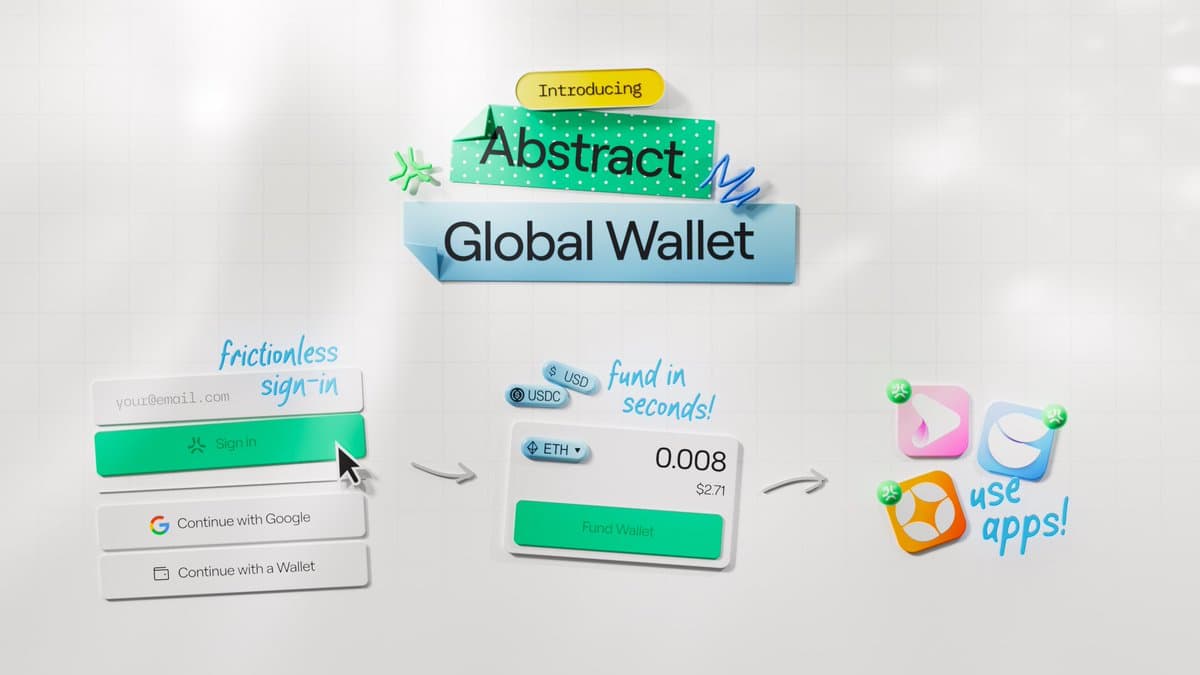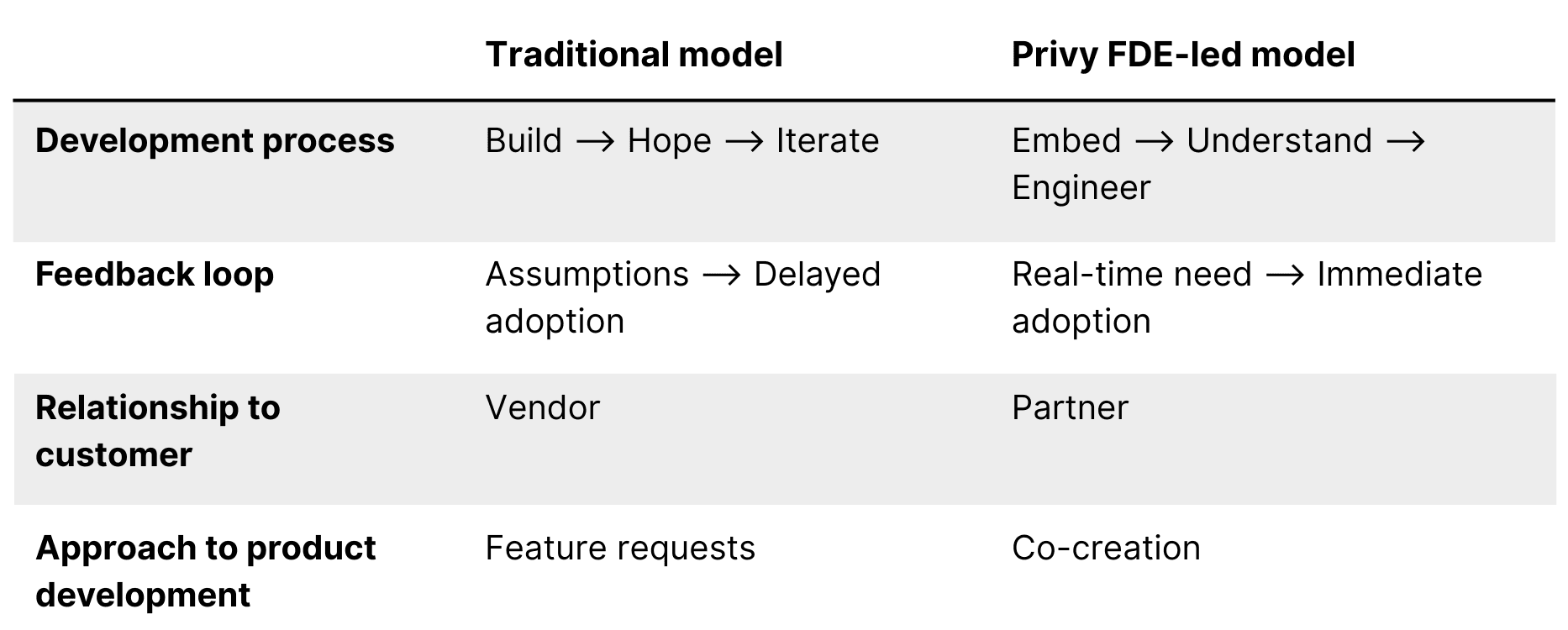Engineering at the speed of our customers
Inside Privy’s Forward Deployed Engineer (FDE) model and how it helps teams accelerate product-market fit
Jainil Sutaria
|Jul 16, 2025

In tech, things move fast, especially in crypto. Not only do new standards emerge weekly, use cases also evolve in real time. What may be cutting-edge today could quickly become table stakes tomorrow.
At Privy, we’ve built our entire philosophy around keeping pace not just with the market, but with our customers. That means every feature we ship and every optimization we make is grounded in a real use case, and championed by a customer we’re actively building alongside.
We believe product-market fit isn’t something you find once. It’s something you engineer continuously, in real time, with the people building alongside you.
We commit to this belief through one of our most critical roles: the Forward Deployed Engineer (FDE).
What is a forward deployed engineer (FDE)?
FDEs are engineers that work directly with customers to build solutions in real-time. They aren’t DevRel, they’re not support, and they’re not just product-minded engineers. They are technical partners deeply embedded in our customer’s work flow to help design and implement solutions in production, fast.
Origins of the FDE model
The FDE model has roots in companies like Palantir, a data analytics platform used by governments and large enterprises. Engineers were deployed to intelligence agencies and Fortune 500 companies to solve complex, domain-specific problems, because you can’t build the right solution without being close to the problem itself.
That ethos now lives across modern SaaS companies. Teams at companies like Ramp and Stripe all use forward-deployed roles to ship infrastructure that adapts to customer realities, not just best practices.
At Privy, we’ve adapted this model to serve customers who are both crypto-native and entirely new to the space. Our FDEs aren’t just assigned a single support ticket. Rather, they sit in weekly product calls, debug live in customer environments, and also ship real features based on evolving user needs. When a customer hits a blocker, a Privy FDE aims to unblock it as quickly as possible, not defer it to a future sprint or quarterly roadmap.
What an FDE is
Engineering-first: 70% of the role is production-level engineering. That means writing code, deploying features, and maintaining systems.
Product-aware: FDEs help prioritize what to build based on real-time feedback and recurring customer needs.
Customer-embedded: They’re on the ground with our biggest partners, translating technical needs into product launches.

What an FDE is not
Not DevRel: DevRel shows customers how to use existing tools. FDEs build tools the customer needs.
Not Support: Support works around limitations. FDEs remove them entirely.
Not Solutions Engineering: Solutions configure dashboards. FDEs co-architect workflows.
In short, FDEs don’t just support customers, they help shape the product in real time. By embedding directly into customer workflows, FDEs ensure what we build is not only usable, but indispensable.
FDE in action: how Privy builds with customers, not just for them
At Privy, every major product initiative begins with a real customer use case. FDEs are closely integrated into our customer success experience from day one, where they scope, ship, and refine closely alongside our partners.
That can sometimes look like working with a single customer on a bespoke solution, or synthesizing feedback across multiple customers to scope out a flexible implementation that suits varying needs.
Building a global wallet ecosystem with Abstract
Abstract wanted a wallet identity that spanned across apps in their ecosystem, complete with custom smart wallet contracts and bespoke UI. Privy’s FDEs worked with their team to co-architect a seamless solution, splitting logic between SDKs and smart contracts, and ensuring it scaled beyond Abstract for other ecosystems as well.

Extending gas sponsorship and EIP-7702 capabilities across customers
With the 7702 standard emerging and gas sponsorship growing in demand, our FDEs worked directly with customers and spec authors to build flexible implementations. Rather than waiting for the standard to settle, our team shaped it from within. This resulted in wallet flows that let developers move fast while staying compatible with evolving protocols.
In both of these cases, the result wasn’t just a standalone solution. It became a capability shipped as part of Privy’s core product offering, and made available to every customer going forward.
From reactive to proactive: a new model for engineering
Most teams still follow a traditional engineering playbook, and ship features based on best assumptions. But in fast-moving environments, that model can often lead to misalignment, slow iteration, and missed opportunities.
At Privy, we’ve adopted a different approach:

We believe this model yields several benefits:
Faster shipping: Product solutions go from idea to production in weeks, not months
Greater accuracy: Features are built around real customer needs, not internal assumptions
Stronger relationships: Customers become partners, not just buyers
Deeper innovation: Features are co-created alongside customers, not simply requested
Closing thoughts
At Privy, we don’t just build for our customers, we build with them. Our FDEs are the connective tissue between product strategy and real-world usage, which helps both us and our customers to move faster, build smarter, and partner more deeply. Together, product-market fit isn’t left to chance, it’s deliberately engineered.
This model has shaped some of the most impactful features in our product, as well as forged the most valuable relationships in our ecosystem.
Does this sound like a good fit for you? We’re hiring forward deployed engineers and other roles across the team. Learn more and apply.

